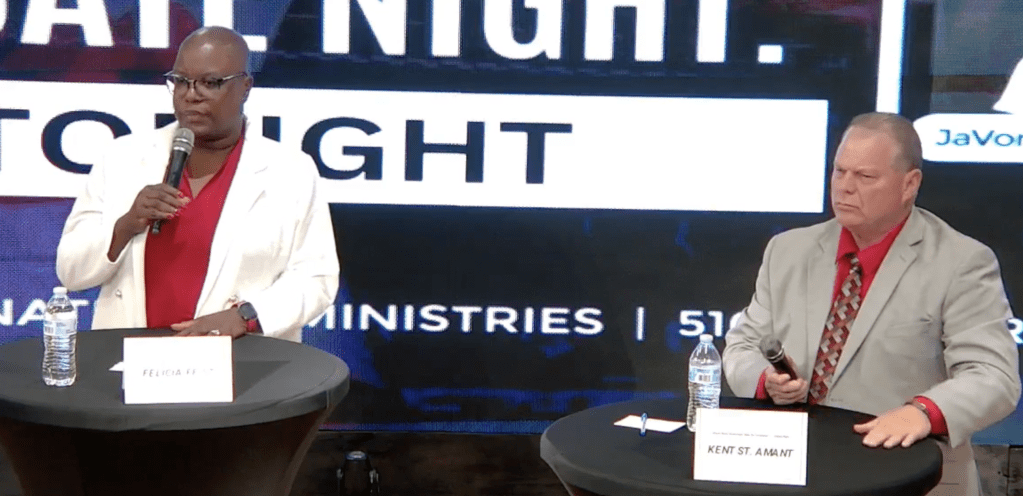Suspicions of voter fraud raised in Clerk of Court election
Published 4:01 pm Tuesday, October 31, 2023

- Feist and St. Amant during the Church Meets Government Debate Night on Oct. 3.
|
Getting your Trinity Audio player ready...
|
The Oct. 14 election called for a run-off for the Clerk of Court, with Felicia Feist garnering 36.92 percent of votes and Kent St. Amant 35.31 percent, according to the Secretary of State’s website. These results have raised concerns for some, leading to allegations of impropriety.
Concerns were raised regarding Feist’s continued employment at the Clerk of Court’s office as deputy chief clerk during her campaign. The employment of Feist’s daughter at the Registrar of Voters’ office during the election was also brought into question. Additionally, there is reportedly an ongoing investigation into alleged misconduct by an election commissioner at the polls.
Anita Haley, one of Feist’s opposing candidates in the Oct. 14 election, claims that she had suspicions about Feist’s campaign early on.
“I called actually right after I qualified, and I said, I’m aware that my opponent, Felicia Feist is still currently working, and that’s against the Hatch Act,” Haley said.
According to the U.S. Office of Special Counsel, The Hatch Act, a federal law passed in 1939, limits certain political activities of federal employees, as well as some state, D.C., and local government employees who work in connection with federally funded programs.
The law exists, in part, to ensure that federal employees are advanced based on merit and not based on political affiliation.
The Hatch Act prohibits restricted employees from engaging in political activity while the employee is “on duty, in any federal room or building, while wearing a uniform or official insignia, or using any federally owned or leased vehicle.”
Federal employees fall within two categories under the Hatch Act, Further Restricted and Less Restricted. The Hatch Act differently affects “more restricted” and “less restricted” employees, with more restricted employees unable to run for office in a partisan election altogether.
Chief deputy clerk, according to stipulations listed on the U.S. Office of Special Counsel website, is not a “more restricted” position.
“Whenever I’m campaigning, I’m off the clock,” Feist said in regards to the Hatch Act. “We punch in and out, so I would never be campaigning [at work] because when I’m campaigning, I’m away from the office.”
Haley and St. Amant also shared concerns regarding Feist’s daughter being employed by the Registrar of Voters during the election.
St. Amant sent an email to St. John Parish Registrar of Voters Russell Jack outlining his concerns regarding Feist’s campaign.
“This email serves as official notice to recuse any and all members of Felicia Feist’s family from participating in the absentee and election primary on Oct. 14, 2023,” said the email. “This is in direct conflict as Mrs. Feist is a candidate for this open position in which she currently serves as the chief deputy clerk for St. John the Baptist Parish Clerk of Court’s office.”
St. Amant also informed Jack in his email that his campaign had brought this concern to the attention of state-level offices.
St. Amant claimed that he did not receive a response to his email.
According to Jack, the Registrar of Voters’ office submitted the concern to the Secretary of State, and Feist’s daughter’s continued employment was approved by the Attorney General’s office.
“Her daughter has been here for six years. That is her job, and she needs to remain doing her job,” said Jack. “There is nothing that she can do in the capacity of her job to deal with the election.”
Feist defended her daughter’s employment with the Registrar of Voters.
“She’s doing her job,” Feist said. “ I don’t think that has anything to do with me.”
“That office runs a straight campaign and nothing is done illegally,” Feist said. “I’ve actually witnessed the process before and I don’t see where anything that they do is not on the up and up.”
According to St. Amant, there is allegedly an ongoing investigation within the Secretary of State’s office due to alleged misconduct from an election commissioner at the polls.
Voter Lisa Joseph submitted a statement to the Secretary of State, claiming that election commissioner Christine Roybiskie approached her at a polling location and encouraged her to vote for a specific candidate for Clerk of Court.
“She wanted me to vote for a certain person and I told her no, I didn’t want to vote for that person. I wanted to vote for someone else,” Joseph said. “I told the Secretary of State.”
“I don’t have a comment on what happened election day because I wasn’t a witness to that,” St. Amant said. “All I can tell you is I forewarned everything that could potentially happen. These are the things in question that I mentioned and it was ignored.”
Jack could not comment on behalf of the Registrar of Voters’ office regarding these allegations due to the ongoing investigation, although he said “I don’t even train the commissioners. They are trained by the Clerk of Court.”
According to Feist, she has not heard anything about election commissioners coercing voters and was not made aware of an investigation.
L’OBSERVATEUR reached out to the Secretary of State’s office regarding the investigation and received a response from Deputy Secretary for Communications John Tobler.
“Per our conversation regarding Christine Roybiskie, it is against our policy to comment on open investigations,” Tobler said. “However, out of an abundance of caution, we have asked that Ms. Roybiskie not be selected as a voting commissioner for the upcoming election. Further questions should be directed to the St. John District Attorney.”





